Middle East Politics: Impact of WWI, Orientalism, and Twin Tolerations
VerifiedAdded on 2022/10/18
|12
|3552
|10
Essay
AI Summary
This assignment comprises three essays addressing key aspects of Middle East politics. The first essay examines how World War I redrew the map of the Middle East, focusing on the specific cases of Turkey, Iraq, and Palestine, detailing the shift in power dynamics and the emergence of new conflicts. The second essay delves into Edward Said's critique of "Orientalism," highlighting two vital elements: the systematic knowledge of the Orient and Europe's dominance, with examples from Iran and Iraq. It discusses the misrepresentations of the Middle East and the impact of Western attitudes. The third essay analyzes Alfred Stepan's concept of "twin tolerations," using Tunisia as a case study to illustrate the interplay between political authorities, religious leaders, political modernity, and democratization, and how this model challenges conventional wisdom.
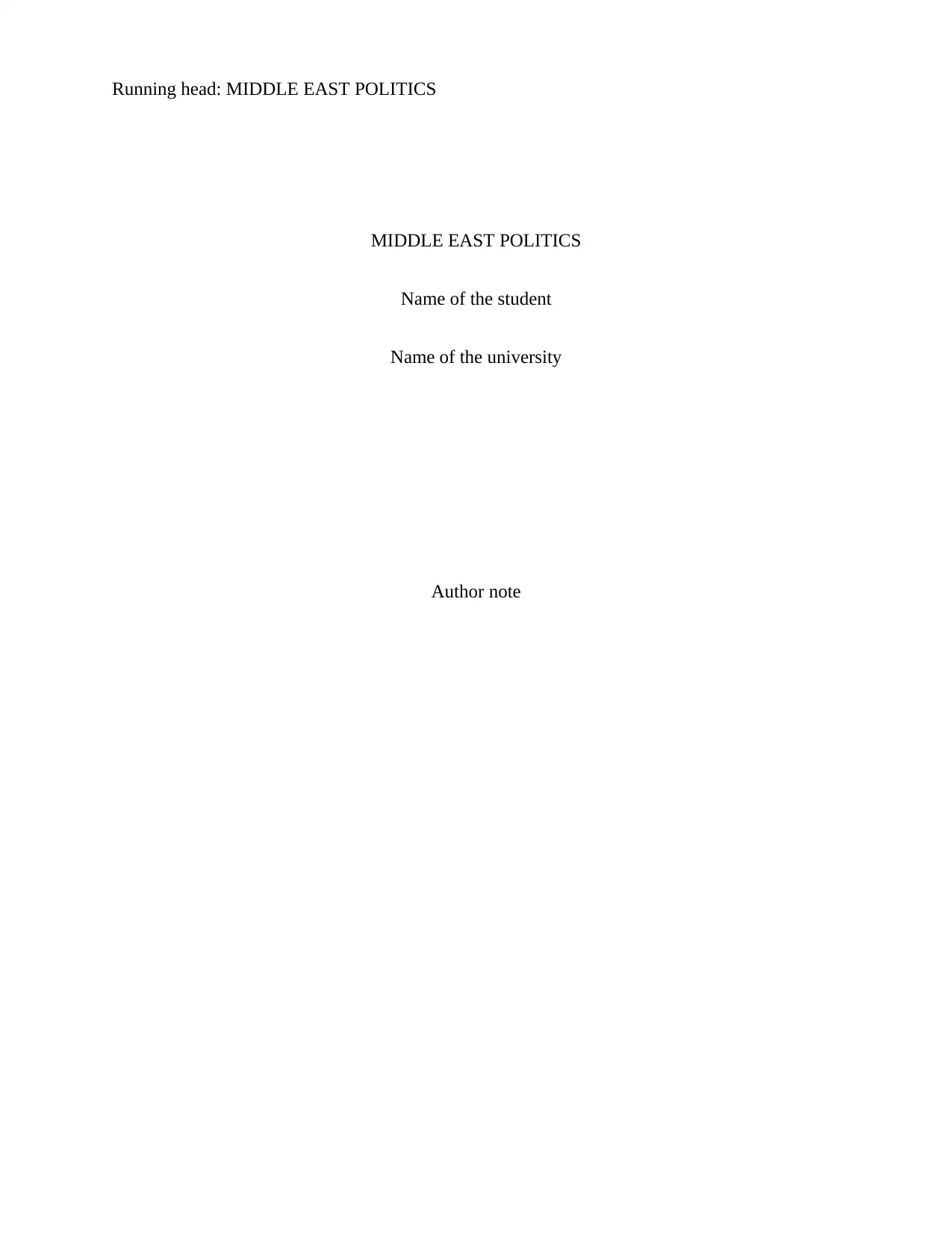
Running head: MIDDLE EAST POLITICS
MIDDLE EAST POLITICS
Name of the student
Name of the university
Author note
MIDDLE EAST POLITICS
Name of the student
Name of the university
Author note
Paraphrase This Document
Need a fresh take? Get an instant paraphrase of this document with our AI Paraphraser
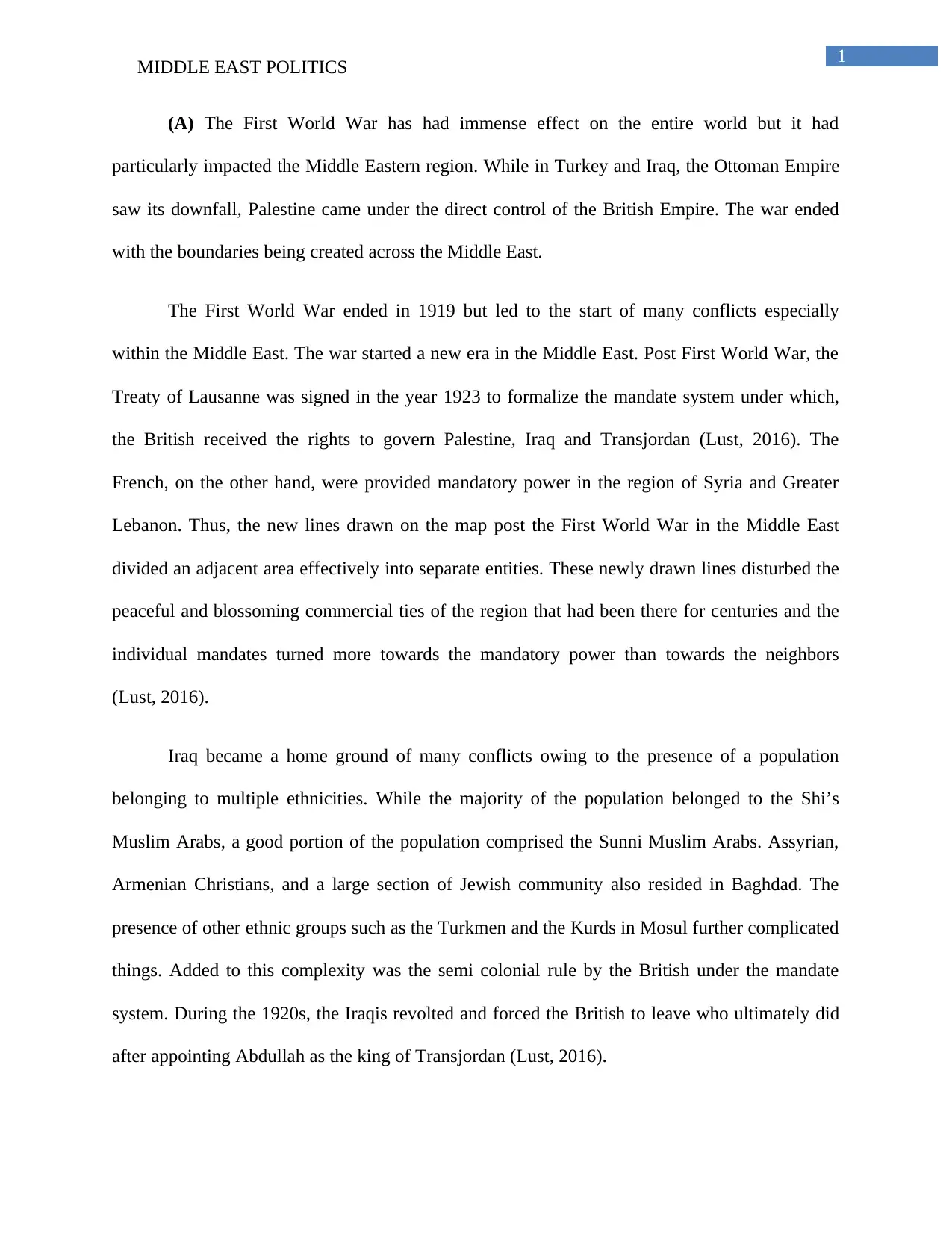
1
MIDDLE EAST POLITICS
(A) The First World War has had immense effect on the entire world but it had
particularly impacted the Middle Eastern region. While in Turkey and Iraq, the Ottoman Empire
saw its downfall, Palestine came under the direct control of the British Empire. The war ended
with the boundaries being created across the Middle East.
The First World War ended in 1919 but led to the start of many conflicts especially
within the Middle East. The war started a new era in the Middle East. Post First World War, the
Treaty of Lausanne was signed in the year 1923 to formalize the mandate system under which,
the British received the rights to govern Palestine, Iraq and Transjordan (Lust, 2016). The
French, on the other hand, were provided mandatory power in the region of Syria and Greater
Lebanon. Thus, the new lines drawn on the map post the First World War in the Middle East
divided an adjacent area effectively into separate entities. These newly drawn lines disturbed the
peaceful and blossoming commercial ties of the region that had been there for centuries and the
individual mandates turned more towards the mandatory power than towards the neighbors
(Lust, 2016).
Iraq became a home ground of many conflicts owing to the presence of a population
belonging to multiple ethnicities. While the majority of the population belonged to the Shi’s
Muslim Arabs, a good portion of the population comprised the Sunni Muslim Arabs. Assyrian,
Armenian Christians, and a large section of Jewish community also resided in Baghdad. The
presence of other ethnic groups such as the Turkmen and the Kurds in Mosul further complicated
things. Added to this complexity was the semi colonial rule by the British under the mandate
system. During the 1920s, the Iraqis revolted and forced the British to leave who ultimately did
after appointing Abdullah as the king of Transjordan (Lust, 2016).
MIDDLE EAST POLITICS
(A) The First World War has had immense effect on the entire world but it had
particularly impacted the Middle Eastern region. While in Turkey and Iraq, the Ottoman Empire
saw its downfall, Palestine came under the direct control of the British Empire. The war ended
with the boundaries being created across the Middle East.
The First World War ended in 1919 but led to the start of many conflicts especially
within the Middle East. The war started a new era in the Middle East. Post First World War, the
Treaty of Lausanne was signed in the year 1923 to formalize the mandate system under which,
the British received the rights to govern Palestine, Iraq and Transjordan (Lust, 2016). The
French, on the other hand, were provided mandatory power in the region of Syria and Greater
Lebanon. Thus, the new lines drawn on the map post the First World War in the Middle East
divided an adjacent area effectively into separate entities. These newly drawn lines disturbed the
peaceful and blossoming commercial ties of the region that had been there for centuries and the
individual mandates turned more towards the mandatory power than towards the neighbors
(Lust, 2016).
Iraq became a home ground of many conflicts owing to the presence of a population
belonging to multiple ethnicities. While the majority of the population belonged to the Shi’s
Muslim Arabs, a good portion of the population comprised the Sunni Muslim Arabs. Assyrian,
Armenian Christians, and a large section of Jewish community also resided in Baghdad. The
presence of other ethnic groups such as the Turkmen and the Kurds in Mosul further complicated
things. Added to this complexity was the semi colonial rule by the British under the mandate
system. During the 1920s, the Iraqis revolted and forced the British to leave who ultimately did
after appointing Abdullah as the king of Transjordan (Lust, 2016).
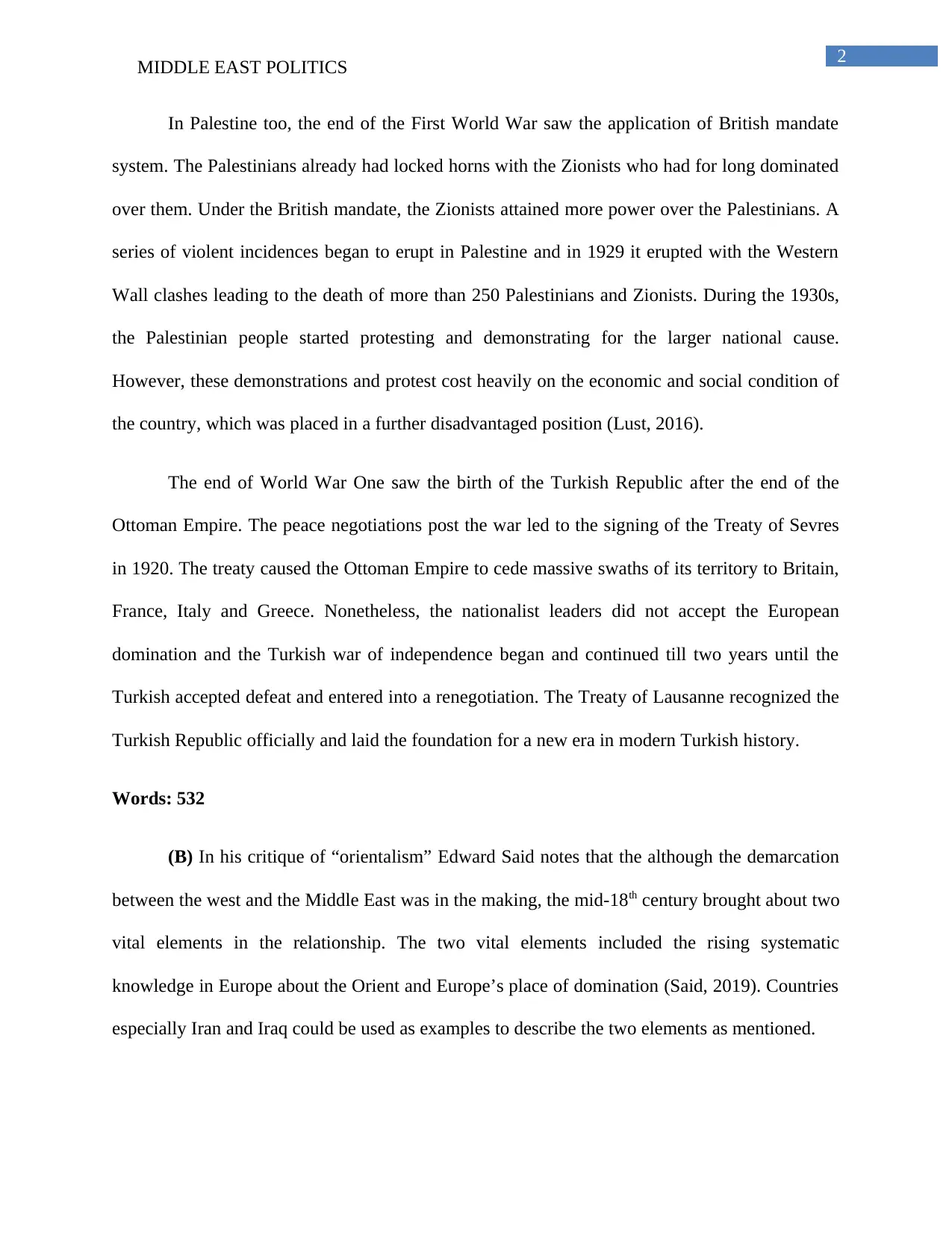
2
MIDDLE EAST POLITICS
In Palestine too, the end of the First World War saw the application of British mandate
system. The Palestinians already had locked horns with the Zionists who had for long dominated
over them. Under the British mandate, the Zionists attained more power over the Palestinians. A
series of violent incidences began to erupt in Palestine and in 1929 it erupted with the Western
Wall clashes leading to the death of more than 250 Palestinians and Zionists. During the 1930s,
the Palestinian people started protesting and demonstrating for the larger national cause.
However, these demonstrations and protest cost heavily on the economic and social condition of
the country, which was placed in a further disadvantaged position (Lust, 2016).
The end of World War One saw the birth of the Turkish Republic after the end of the
Ottoman Empire. The peace negotiations post the war led to the signing of the Treaty of Sevres
in 1920. The treaty caused the Ottoman Empire to cede massive swaths of its territory to Britain,
France, Italy and Greece. Nonetheless, the nationalist leaders did not accept the European
domination and the Turkish war of independence began and continued till two years until the
Turkish accepted defeat and entered into a renegotiation. The Treaty of Lausanne recognized the
Turkish Republic officially and laid the foundation for a new era in modern Turkish history.
Words: 532
(B) In his critique of “orientalism” Edward Said notes that the although the demarcation
between the west and the Middle East was in the making, the mid-18th century brought about two
vital elements in the relationship. The two vital elements included the rising systematic
knowledge in Europe about the Orient and Europe’s place of domination (Said, 2019). Countries
especially Iran and Iraq could be used as examples to describe the two elements as mentioned.
MIDDLE EAST POLITICS
In Palestine too, the end of the First World War saw the application of British mandate
system. The Palestinians already had locked horns with the Zionists who had for long dominated
over them. Under the British mandate, the Zionists attained more power over the Palestinians. A
series of violent incidences began to erupt in Palestine and in 1929 it erupted with the Western
Wall clashes leading to the death of more than 250 Palestinians and Zionists. During the 1930s,
the Palestinian people started protesting and demonstrating for the larger national cause.
However, these demonstrations and protest cost heavily on the economic and social condition of
the country, which was placed in a further disadvantaged position (Lust, 2016).
The end of World War One saw the birth of the Turkish Republic after the end of the
Ottoman Empire. The peace negotiations post the war led to the signing of the Treaty of Sevres
in 1920. The treaty caused the Ottoman Empire to cede massive swaths of its territory to Britain,
France, Italy and Greece. Nonetheless, the nationalist leaders did not accept the European
domination and the Turkish war of independence began and continued till two years until the
Turkish accepted defeat and entered into a renegotiation. The Treaty of Lausanne recognized the
Turkish Republic officially and laid the foundation for a new era in modern Turkish history.
Words: 532
(B) In his critique of “orientalism” Edward Said notes that the although the demarcation
between the west and the Middle East was in the making, the mid-18th century brought about two
vital elements in the relationship. The two vital elements included the rising systematic
knowledge in Europe about the Orient and Europe’s place of domination (Said, 2019). Countries
especially Iran and Iraq could be used as examples to describe the two elements as mentioned.
⊘ This is a preview!⊘
Do you want full access?
Subscribe today to unlock all pages.

Trusted by 1+ million students worldwide
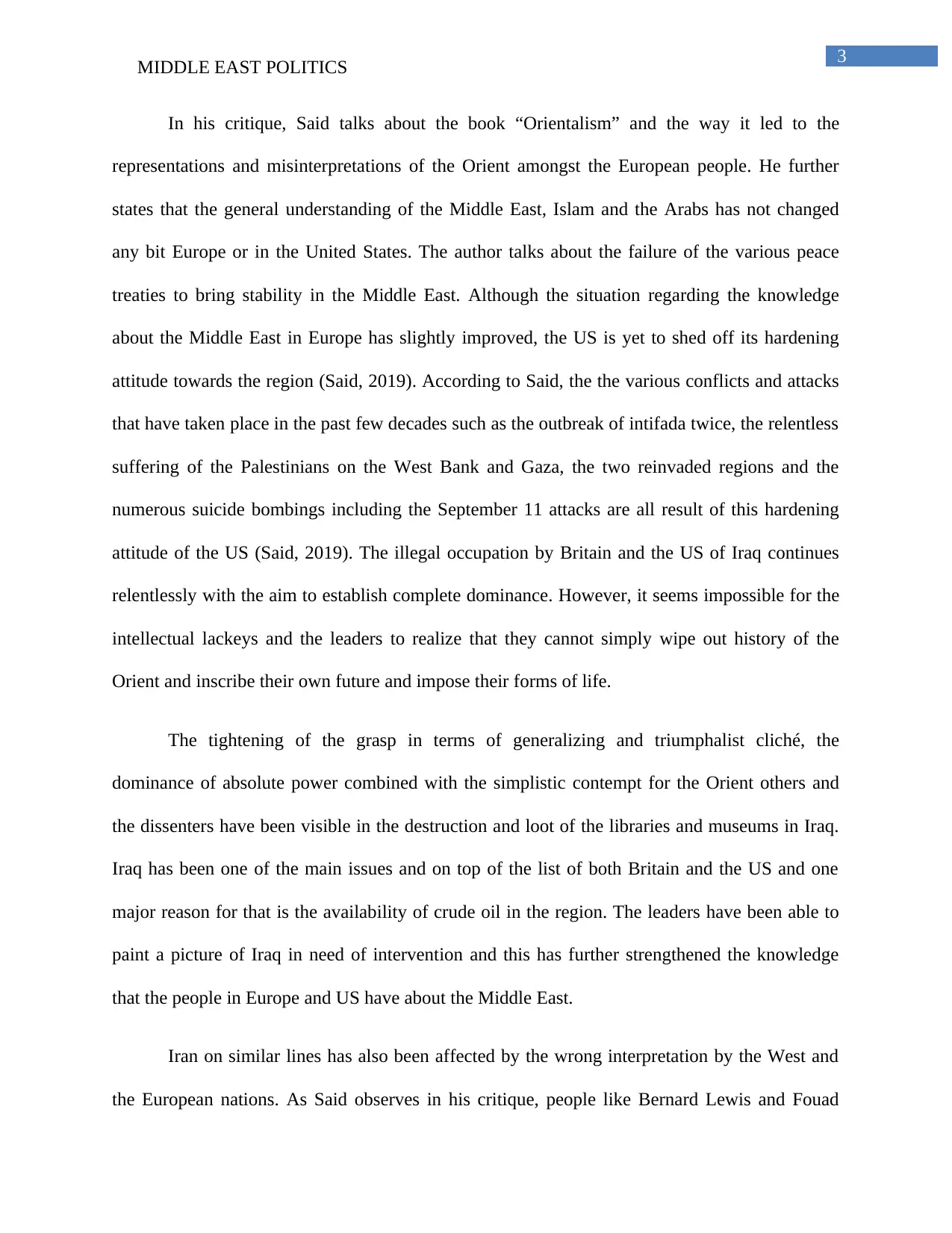
3
MIDDLE EAST POLITICS
In his critique, Said talks about the book “Orientalism” and the way it led to the
representations and misinterpretations of the Orient amongst the European people. He further
states that the general understanding of the Middle East, Islam and the Arabs has not changed
any bit Europe or in the United States. The author talks about the failure of the various peace
treaties to bring stability in the Middle East. Although the situation regarding the knowledge
about the Middle East in Europe has slightly improved, the US is yet to shed off its hardening
attitude towards the region (Said, 2019). According to Said, the the various conflicts and attacks
that have taken place in the past few decades such as the outbreak of intifada twice, the relentless
suffering of the Palestinians on the West Bank and Gaza, the two reinvaded regions and the
numerous suicide bombings including the September 11 attacks are all result of this hardening
attitude of the US (Said, 2019). The illegal occupation by Britain and the US of Iraq continues
relentlessly with the aim to establish complete dominance. However, it seems impossible for the
intellectual lackeys and the leaders to realize that they cannot simply wipe out history of the
Orient and inscribe their own future and impose their forms of life.
The tightening of the grasp in terms of generalizing and triumphalist cliché, the
dominance of absolute power combined with the simplistic contempt for the Orient others and
the dissenters have been visible in the destruction and loot of the libraries and museums in Iraq.
Iraq has been one of the main issues and on top of the list of both Britain and the US and one
major reason for that is the availability of crude oil in the region. The leaders have been able to
paint a picture of Iraq in need of intervention and this has further strengthened the knowledge
that the people in Europe and US have about the Middle East.
Iran on similar lines has also been affected by the wrong interpretation by the West and
the European nations. As Said observes in his critique, people like Bernard Lewis and Fouad
MIDDLE EAST POLITICS
In his critique, Said talks about the book “Orientalism” and the way it led to the
representations and misinterpretations of the Orient amongst the European people. He further
states that the general understanding of the Middle East, Islam and the Arabs has not changed
any bit Europe or in the United States. The author talks about the failure of the various peace
treaties to bring stability in the Middle East. Although the situation regarding the knowledge
about the Middle East in Europe has slightly improved, the US is yet to shed off its hardening
attitude towards the region (Said, 2019). According to Said, the the various conflicts and attacks
that have taken place in the past few decades such as the outbreak of intifada twice, the relentless
suffering of the Palestinians on the West Bank and Gaza, the two reinvaded regions and the
numerous suicide bombings including the September 11 attacks are all result of this hardening
attitude of the US (Said, 2019). The illegal occupation by Britain and the US of Iraq continues
relentlessly with the aim to establish complete dominance. However, it seems impossible for the
intellectual lackeys and the leaders to realize that they cannot simply wipe out history of the
Orient and inscribe their own future and impose their forms of life.
The tightening of the grasp in terms of generalizing and triumphalist cliché, the
dominance of absolute power combined with the simplistic contempt for the Orient others and
the dissenters have been visible in the destruction and loot of the libraries and museums in Iraq.
Iraq has been one of the main issues and on top of the list of both Britain and the US and one
major reason for that is the availability of crude oil in the region. The leaders have been able to
paint a picture of Iraq in need of intervention and this has further strengthened the knowledge
that the people in Europe and US have about the Middle East.
Iran on similar lines has also been affected by the wrong interpretation by the West and
the European nations. As Said observes in his critique, people like Bernard Lewis and Fouad
Paraphrase This Document
Need a fresh take? Get an instant paraphrase of this document with our AI Paraphraser
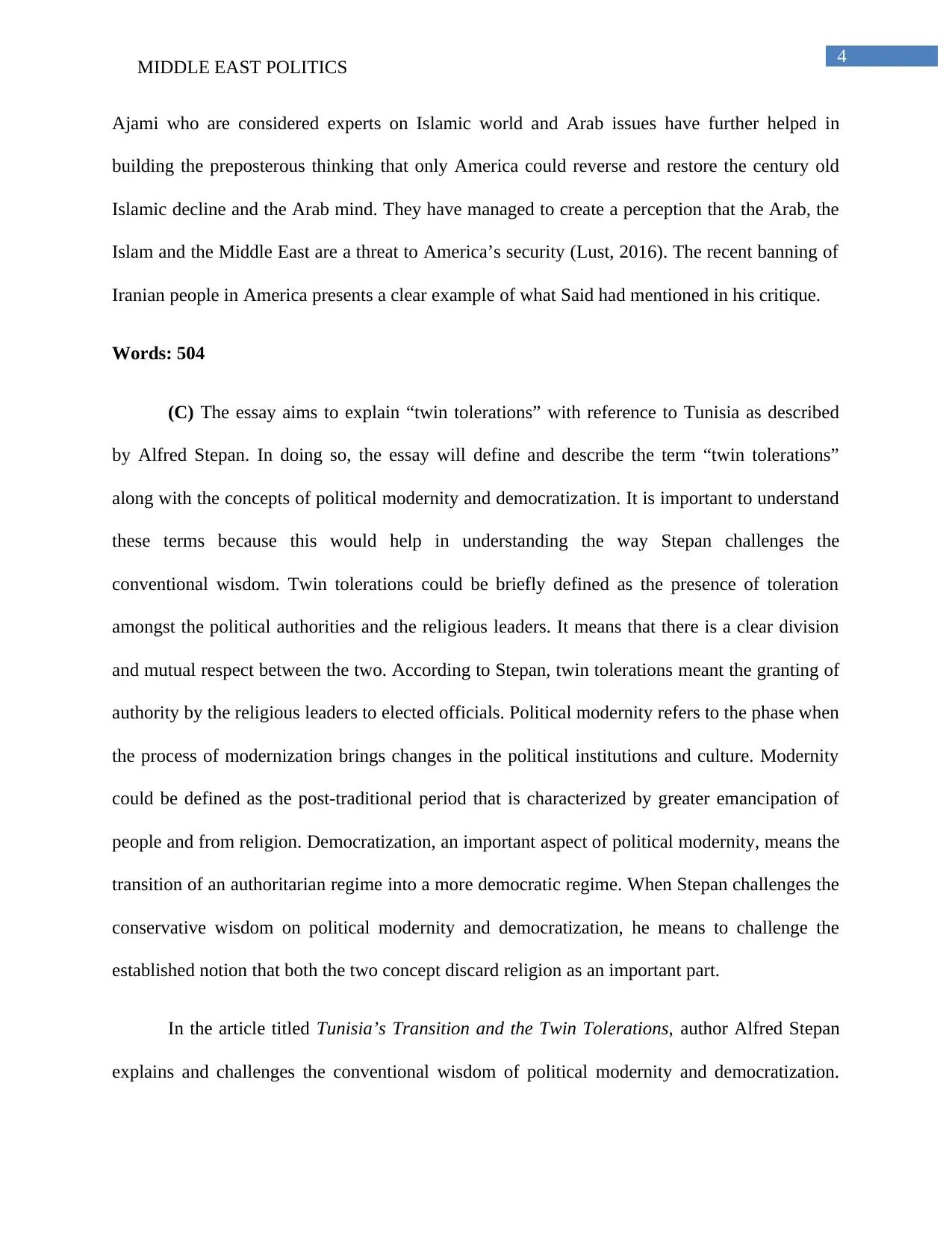
4
MIDDLE EAST POLITICS
Ajami who are considered experts on Islamic world and Arab issues have further helped in
building the preposterous thinking that only America could reverse and restore the century old
Islamic decline and the Arab mind. They have managed to create a perception that the Arab, the
Islam and the Middle East are a threat to America’s security (Lust, 2016). The recent banning of
Iranian people in America presents a clear example of what Said had mentioned in his critique.
Words: 504
(C) The essay aims to explain “twin tolerations” with reference to Tunisia as described
by Alfred Stepan. In doing so, the essay will define and describe the term “twin tolerations”
along with the concepts of political modernity and democratization. It is important to understand
these terms because this would help in understanding the way Stepan challenges the
conventional wisdom. Twin tolerations could be briefly defined as the presence of toleration
amongst the political authorities and the religious leaders. It means that there is a clear division
and mutual respect between the two. According to Stepan, twin tolerations meant the granting of
authority by the religious leaders to elected officials. Political modernity refers to the phase when
the process of modernization brings changes in the political institutions and culture. Modernity
could be defined as the post-traditional period that is characterized by greater emancipation of
people and from religion. Democratization, an important aspect of political modernity, means the
transition of an authoritarian regime into a more democratic regime. When Stepan challenges the
conservative wisdom on political modernity and democratization, he means to challenge the
established notion that both the two concept discard religion as an important part.
In the article titled Tunisia’s Transition and the Twin Tolerations, author Alfred Stepan
explains and challenges the conventional wisdom of political modernity and democratization.
MIDDLE EAST POLITICS
Ajami who are considered experts on Islamic world and Arab issues have further helped in
building the preposterous thinking that only America could reverse and restore the century old
Islamic decline and the Arab mind. They have managed to create a perception that the Arab, the
Islam and the Middle East are a threat to America’s security (Lust, 2016). The recent banning of
Iranian people in America presents a clear example of what Said had mentioned in his critique.
Words: 504
(C) The essay aims to explain “twin tolerations” with reference to Tunisia as described
by Alfred Stepan. In doing so, the essay will define and describe the term “twin tolerations”
along with the concepts of political modernity and democratization. It is important to understand
these terms because this would help in understanding the way Stepan challenges the
conventional wisdom. Twin tolerations could be briefly defined as the presence of toleration
amongst the political authorities and the religious leaders. It means that there is a clear division
and mutual respect between the two. According to Stepan, twin tolerations meant the granting of
authority by the religious leaders to elected officials. Political modernity refers to the phase when
the process of modernization brings changes in the political institutions and culture. Modernity
could be defined as the post-traditional period that is characterized by greater emancipation of
people and from religion. Democratization, an important aspect of political modernity, means the
transition of an authoritarian regime into a more democratic regime. When Stepan challenges the
conservative wisdom on political modernity and democratization, he means to challenge the
established notion that both the two concept discard religion as an important part.
In the article titled Tunisia’s Transition and the Twin Tolerations, author Alfred Stepan
explains and challenges the conventional wisdom of political modernity and democratization.
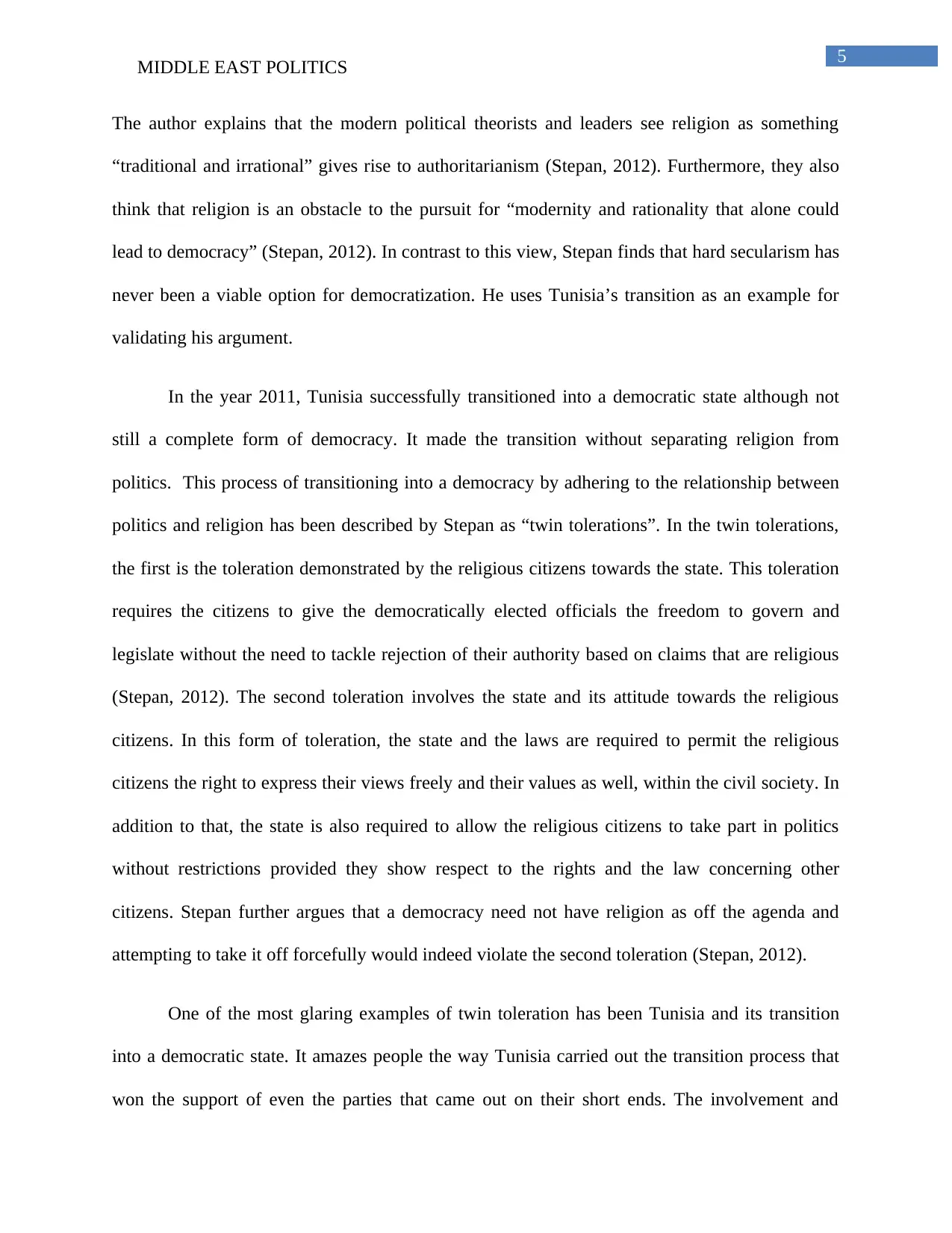
5
MIDDLE EAST POLITICS
The author explains that the modern political theorists and leaders see religion as something
“traditional and irrational” gives rise to authoritarianism (Stepan, 2012). Furthermore, they also
think that religion is an obstacle to the pursuit for “modernity and rationality that alone could
lead to democracy” (Stepan, 2012). In contrast to this view, Stepan finds that hard secularism has
never been a viable option for democratization. He uses Tunisia’s transition as an example for
validating his argument.
In the year 2011, Tunisia successfully transitioned into a democratic state although not
still a complete form of democracy. It made the transition without separating religion from
politics. This process of transitioning into a democracy by adhering to the relationship between
politics and religion has been described by Stepan as “twin tolerations”. In the twin tolerations,
the first is the toleration demonstrated by the religious citizens towards the state. This toleration
requires the citizens to give the democratically elected officials the freedom to govern and
legislate without the need to tackle rejection of their authority based on claims that are religious
(Stepan, 2012). The second toleration involves the state and its attitude towards the religious
citizens. In this form of toleration, the state and the laws are required to permit the religious
citizens the right to express their views freely and their values as well, within the civil society. In
addition to that, the state is also required to allow the religious citizens to take part in politics
without restrictions provided they show respect to the rights and the law concerning other
citizens. Stepan further argues that a democracy need not have religion as off the agenda and
attempting to take it off forcefully would indeed violate the second toleration (Stepan, 2012).
One of the most glaring examples of twin toleration has been Tunisia and its transition
into a democratic state. It amazes people the way Tunisia carried out the transition process that
won the support of even the parties that came out on their short ends. The involvement and
MIDDLE EAST POLITICS
The author explains that the modern political theorists and leaders see religion as something
“traditional and irrational” gives rise to authoritarianism (Stepan, 2012). Furthermore, they also
think that religion is an obstacle to the pursuit for “modernity and rationality that alone could
lead to democracy” (Stepan, 2012). In contrast to this view, Stepan finds that hard secularism has
never been a viable option for democratization. He uses Tunisia’s transition as an example for
validating his argument.
In the year 2011, Tunisia successfully transitioned into a democratic state although not
still a complete form of democracy. It made the transition without separating religion from
politics. This process of transitioning into a democracy by adhering to the relationship between
politics and religion has been described by Stepan as “twin tolerations”. In the twin tolerations,
the first is the toleration demonstrated by the religious citizens towards the state. This toleration
requires the citizens to give the democratically elected officials the freedom to govern and
legislate without the need to tackle rejection of their authority based on claims that are religious
(Stepan, 2012). The second toleration involves the state and its attitude towards the religious
citizens. In this form of toleration, the state and the laws are required to permit the religious
citizens the right to express their views freely and their values as well, within the civil society. In
addition to that, the state is also required to allow the religious citizens to take part in politics
without restrictions provided they show respect to the rights and the law concerning other
citizens. Stepan further argues that a democracy need not have religion as off the agenda and
attempting to take it off forcefully would indeed violate the second toleration (Stepan, 2012).
One of the most glaring examples of twin toleration has been Tunisia and its transition
into a democratic state. It amazes people the way Tunisia carried out the transition process that
won the support of even the parties that came out on their short ends. The involvement and
⊘ This is a preview!⊘
Do you want full access?
Subscribe today to unlock all pages.

Trusted by 1+ million students worldwide
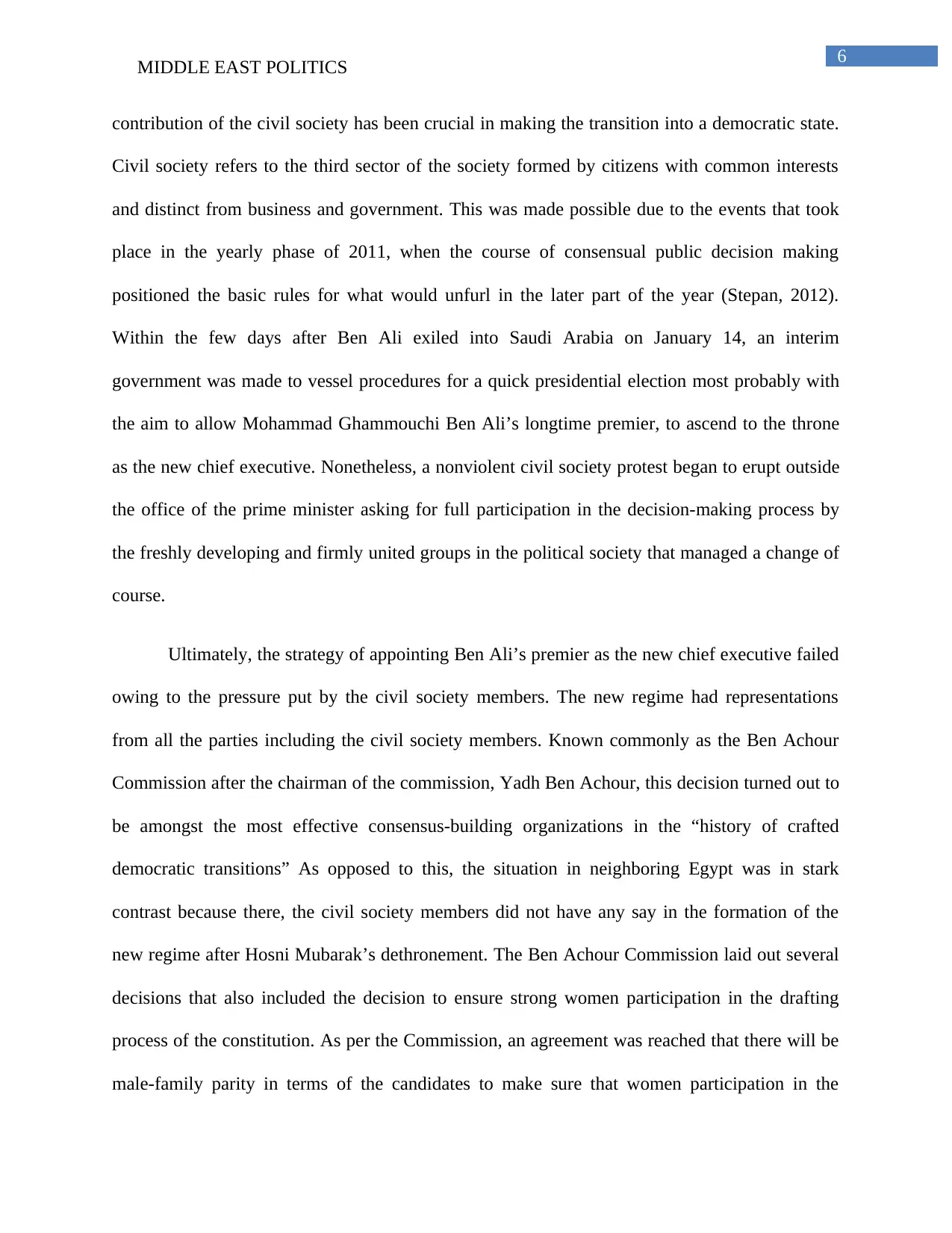
6
MIDDLE EAST POLITICS
contribution of the civil society has been crucial in making the transition into a democratic state.
Civil society refers to the third sector of the society formed by citizens with common interests
and distinct from business and government. This was made possible due to the events that took
place in the yearly phase of 2011, when the course of consensual public decision making
positioned the basic rules for what would unfurl in the later part of the year (Stepan, 2012).
Within the few days after Ben Ali exiled into Saudi Arabia on January 14, an interim
government was made to vessel procedures for a quick presidential election most probably with
the aim to allow Mohammad Ghammouchi Ben Ali’s longtime premier, to ascend to the throne
as the new chief executive. Nonetheless, a nonviolent civil society protest began to erupt outside
the office of the prime minister asking for full participation in the decision-making process by
the freshly developing and firmly united groups in the political society that managed a change of
course.
Ultimately, the strategy of appointing Ben Ali’s premier as the new chief executive failed
owing to the pressure put by the civil society members. The new regime had representations
from all the parties including the civil society members. Known commonly as the Ben Achour
Commission after the chairman of the commission, Yadh Ben Achour, this decision turned out to
be amongst the most effective consensus-building organizations in the “history of crafted
democratic transitions” As opposed to this, the situation in neighboring Egypt was in stark
contrast because there, the civil society members did not have any say in the formation of the
new regime after Hosni Mubarak’s dethronement. The Ben Achour Commission laid out several
decisions that also included the decision to ensure strong women participation in the drafting
process of the constitution. As per the Commission, an agreement was reached that there will be
male-family parity in terms of the candidates to make sure that women participation in the
MIDDLE EAST POLITICS
contribution of the civil society has been crucial in making the transition into a democratic state.
Civil society refers to the third sector of the society formed by citizens with common interests
and distinct from business and government. This was made possible due to the events that took
place in the yearly phase of 2011, when the course of consensual public decision making
positioned the basic rules for what would unfurl in the later part of the year (Stepan, 2012).
Within the few days after Ben Ali exiled into Saudi Arabia on January 14, an interim
government was made to vessel procedures for a quick presidential election most probably with
the aim to allow Mohammad Ghammouchi Ben Ali’s longtime premier, to ascend to the throne
as the new chief executive. Nonetheless, a nonviolent civil society protest began to erupt outside
the office of the prime minister asking for full participation in the decision-making process by
the freshly developing and firmly united groups in the political society that managed a change of
course.
Ultimately, the strategy of appointing Ben Ali’s premier as the new chief executive failed
owing to the pressure put by the civil society members. The new regime had representations
from all the parties including the civil society members. Known commonly as the Ben Achour
Commission after the chairman of the commission, Yadh Ben Achour, this decision turned out to
be amongst the most effective consensus-building organizations in the “history of crafted
democratic transitions” As opposed to this, the situation in neighboring Egypt was in stark
contrast because there, the civil society members did not have any say in the formation of the
new regime after Hosni Mubarak’s dethronement. The Ben Achour Commission laid out several
decisions that also included the decision to ensure strong women participation in the drafting
process of the constitution. As per the Commission, an agreement was reached that there will be
male-family parity in terms of the candidates to make sure that women participation in the
Paraphrase This Document
Need a fresh take? Get an instant paraphrase of this document with our AI Paraphraser
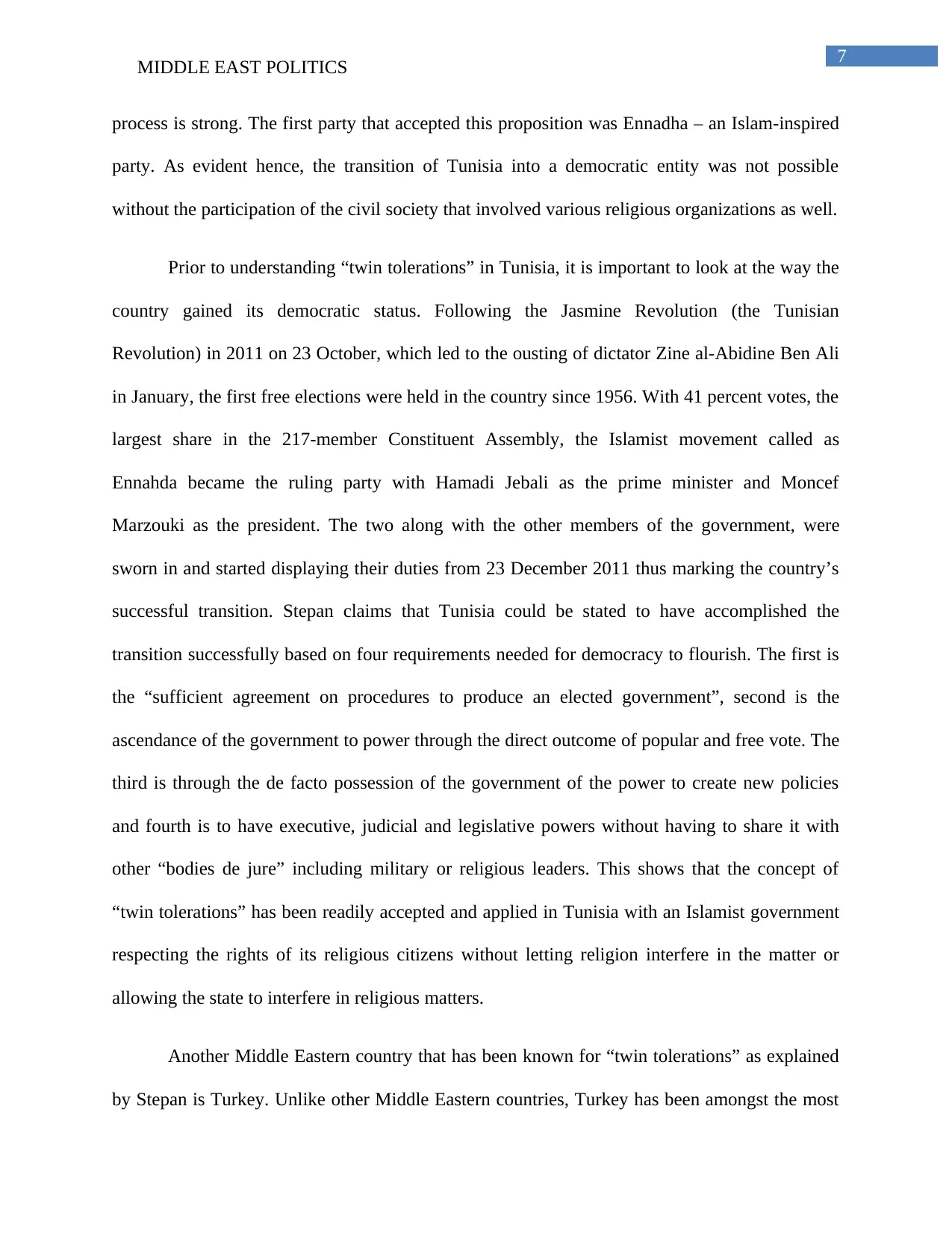
7
MIDDLE EAST POLITICS
process is strong. The first party that accepted this proposition was Ennadha – an Islam-inspired
party. As evident hence, the transition of Tunisia into a democratic entity was not possible
without the participation of the civil society that involved various religious organizations as well.
Prior to understanding “twin tolerations” in Tunisia, it is important to look at the way the
country gained its democratic status. Following the Jasmine Revolution (the Tunisian
Revolution) in 2011 on 23 October, which led to the ousting of dictator Zine al-Abidine Ben Ali
in January, the first free elections were held in the country since 1956. With 41 percent votes, the
largest share in the 217-member Constituent Assembly, the Islamist movement called as
Ennahda became the ruling party with Hamadi Jebali as the prime minister and Moncef
Marzouki as the president. The two along with the other members of the government, were
sworn in and started displaying their duties from 23 December 2011 thus marking the country’s
successful transition. Stepan claims that Tunisia could be stated to have accomplished the
transition successfully based on four requirements needed for democracy to flourish. The first is
the “sufficient agreement on procedures to produce an elected government”, second is the
ascendance of the government to power through the direct outcome of popular and free vote. The
third is through the de facto possession of the government of the power to create new policies
and fourth is to have executive, judicial and legislative powers without having to share it with
other “bodies de jure” including military or religious leaders. This shows that the concept of
“twin tolerations” has been readily accepted and applied in Tunisia with an Islamist government
respecting the rights of its religious citizens without letting religion interfere in the matter or
allowing the state to interfere in religious matters.
Another Middle Eastern country that has been known for “twin tolerations” as explained
by Stepan is Turkey. Unlike other Middle Eastern countries, Turkey has been amongst the most
MIDDLE EAST POLITICS
process is strong. The first party that accepted this proposition was Ennadha – an Islam-inspired
party. As evident hence, the transition of Tunisia into a democratic entity was not possible
without the participation of the civil society that involved various religious organizations as well.
Prior to understanding “twin tolerations” in Tunisia, it is important to look at the way the
country gained its democratic status. Following the Jasmine Revolution (the Tunisian
Revolution) in 2011 on 23 October, which led to the ousting of dictator Zine al-Abidine Ben Ali
in January, the first free elections were held in the country since 1956. With 41 percent votes, the
largest share in the 217-member Constituent Assembly, the Islamist movement called as
Ennahda became the ruling party with Hamadi Jebali as the prime minister and Moncef
Marzouki as the president. The two along with the other members of the government, were
sworn in and started displaying their duties from 23 December 2011 thus marking the country’s
successful transition. Stepan claims that Tunisia could be stated to have accomplished the
transition successfully based on four requirements needed for democracy to flourish. The first is
the “sufficient agreement on procedures to produce an elected government”, second is the
ascendance of the government to power through the direct outcome of popular and free vote. The
third is through the de facto possession of the government of the power to create new policies
and fourth is to have executive, judicial and legislative powers without having to share it with
other “bodies de jure” including military or religious leaders. This shows that the concept of
“twin tolerations” has been readily accepted and applied in Tunisia with an Islamist government
respecting the rights of its religious citizens without letting religion interfere in the matter or
allowing the state to interfere in religious matters.
Another Middle Eastern country that has been known for “twin tolerations” as explained
by Stepan is Turkey. Unlike other Middle Eastern countries, Turkey has been amongst the most
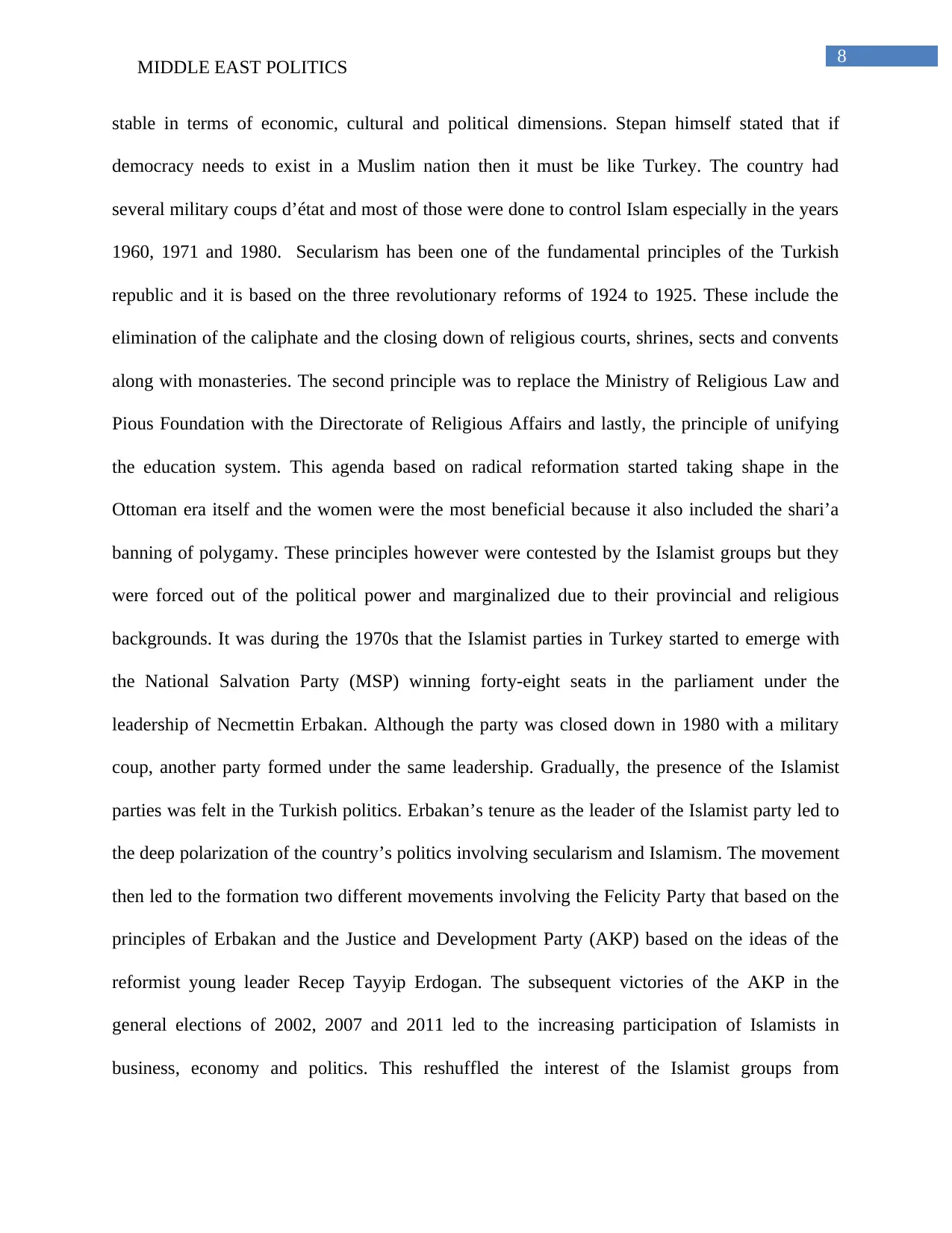
8
MIDDLE EAST POLITICS
stable in terms of economic, cultural and political dimensions. Stepan himself stated that if
democracy needs to exist in a Muslim nation then it must be like Turkey. The country had
several military coups d’état and most of those were done to control Islam especially in the years
1960, 1971 and 1980. Secularism has been one of the fundamental principles of the Turkish
republic and it is based on the three revolutionary reforms of 1924 to 1925. These include the
elimination of the caliphate and the closing down of religious courts, shrines, sects and convents
along with monasteries. The second principle was to replace the Ministry of Religious Law and
Pious Foundation with the Directorate of Religious Affairs and lastly, the principle of unifying
the education system. This agenda based on radical reformation started taking shape in the
Ottoman era itself and the women were the most beneficial because it also included the shari’a
banning of polygamy. These principles however were contested by the Islamist groups but they
were forced out of the political power and marginalized due to their provincial and religious
backgrounds. It was during the 1970s that the Islamist parties in Turkey started to emerge with
the National Salvation Party (MSP) winning forty-eight seats in the parliament under the
leadership of Necmettin Erbakan. Although the party was closed down in 1980 with a military
coup, another party formed under the same leadership. Gradually, the presence of the Islamist
parties was felt in the Turkish politics. Erbakan’s tenure as the leader of the Islamist party led to
the deep polarization of the country’s politics involving secularism and Islamism. The movement
then led to the formation two different movements involving the Felicity Party that based on the
principles of Erbakan and the Justice and Development Party (AKP) based on the ideas of the
reformist young leader Recep Tayyip Erdogan. The subsequent victories of the AKP in the
general elections of 2002, 2007 and 2011 led to the increasing participation of Islamists in
business, economy and politics. This reshuffled the interest of the Islamist groups from
MIDDLE EAST POLITICS
stable in terms of economic, cultural and political dimensions. Stepan himself stated that if
democracy needs to exist in a Muslim nation then it must be like Turkey. The country had
several military coups d’état and most of those were done to control Islam especially in the years
1960, 1971 and 1980. Secularism has been one of the fundamental principles of the Turkish
republic and it is based on the three revolutionary reforms of 1924 to 1925. These include the
elimination of the caliphate and the closing down of religious courts, shrines, sects and convents
along with monasteries. The second principle was to replace the Ministry of Religious Law and
Pious Foundation with the Directorate of Religious Affairs and lastly, the principle of unifying
the education system. This agenda based on radical reformation started taking shape in the
Ottoman era itself and the women were the most beneficial because it also included the shari’a
banning of polygamy. These principles however were contested by the Islamist groups but they
were forced out of the political power and marginalized due to their provincial and religious
backgrounds. It was during the 1970s that the Islamist parties in Turkey started to emerge with
the National Salvation Party (MSP) winning forty-eight seats in the parliament under the
leadership of Necmettin Erbakan. Although the party was closed down in 1980 with a military
coup, another party formed under the same leadership. Gradually, the presence of the Islamist
parties was felt in the Turkish politics. Erbakan’s tenure as the leader of the Islamist party led to
the deep polarization of the country’s politics involving secularism and Islamism. The movement
then led to the formation two different movements involving the Felicity Party that based on the
principles of Erbakan and the Justice and Development Party (AKP) based on the ideas of the
reformist young leader Recep Tayyip Erdogan. The subsequent victories of the AKP in the
general elections of 2002, 2007 and 2011 led to the increasing participation of Islamists in
business, economy and politics. This reshuffled the interest of the Islamist groups from
⊘ This is a preview!⊘
Do you want full access?
Subscribe today to unlock all pages.

Trusted by 1+ million students worldwide
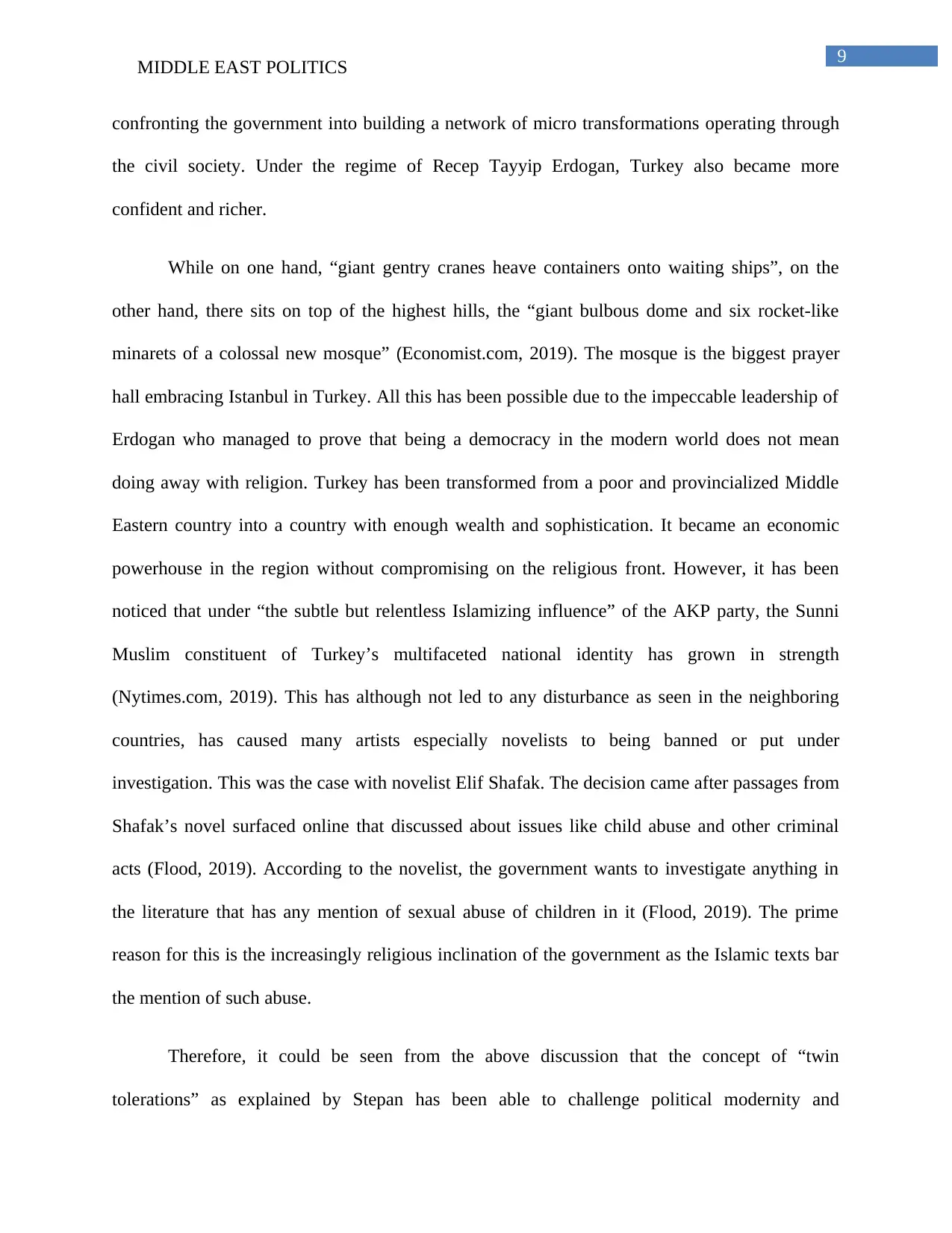
9
MIDDLE EAST POLITICS
confronting the government into building a network of micro transformations operating through
the civil society. Under the regime of Recep Tayyip Erdogan, Turkey also became more
confident and richer.
While on one hand, “giant gentry cranes heave containers onto waiting ships”, on the
other hand, there sits on top of the highest hills, the “giant bulbous dome and six rocket-like
minarets of a colossal new mosque” (Economist.com, 2019). The mosque is the biggest prayer
hall embracing Istanbul in Turkey. All this has been possible due to the impeccable leadership of
Erdogan who managed to prove that being a democracy in the modern world does not mean
doing away with religion. Turkey has been transformed from a poor and provincialized Middle
Eastern country into a country with enough wealth and sophistication. It became an economic
powerhouse in the region without compromising on the religious front. However, it has been
noticed that under “the subtle but relentless Islamizing influence” of the AKP party, the Sunni
Muslim constituent of Turkey’s multifaceted national identity has grown in strength
(Nytimes.com, 2019). This has although not led to any disturbance as seen in the neighboring
countries, has caused many artists especially novelists to being banned or put under
investigation. This was the case with novelist Elif Shafak. The decision came after passages from
Shafak’s novel surfaced online that discussed about issues like child abuse and other criminal
acts (Flood, 2019). According to the novelist, the government wants to investigate anything in
the literature that has any mention of sexual abuse of children in it (Flood, 2019). The prime
reason for this is the increasingly religious inclination of the government as the Islamic texts bar
the mention of such abuse.
Therefore, it could be seen from the above discussion that the concept of “twin
tolerations” as explained by Stepan has been able to challenge political modernity and
MIDDLE EAST POLITICS
confronting the government into building a network of micro transformations operating through
the civil society. Under the regime of Recep Tayyip Erdogan, Turkey also became more
confident and richer.
While on one hand, “giant gentry cranes heave containers onto waiting ships”, on the
other hand, there sits on top of the highest hills, the “giant bulbous dome and six rocket-like
minarets of a colossal new mosque” (Economist.com, 2019). The mosque is the biggest prayer
hall embracing Istanbul in Turkey. All this has been possible due to the impeccable leadership of
Erdogan who managed to prove that being a democracy in the modern world does not mean
doing away with religion. Turkey has been transformed from a poor and provincialized Middle
Eastern country into a country with enough wealth and sophistication. It became an economic
powerhouse in the region without compromising on the religious front. However, it has been
noticed that under “the subtle but relentless Islamizing influence” of the AKP party, the Sunni
Muslim constituent of Turkey’s multifaceted national identity has grown in strength
(Nytimes.com, 2019). This has although not led to any disturbance as seen in the neighboring
countries, has caused many artists especially novelists to being banned or put under
investigation. This was the case with novelist Elif Shafak. The decision came after passages from
Shafak’s novel surfaced online that discussed about issues like child abuse and other criminal
acts (Flood, 2019). According to the novelist, the government wants to investigate anything in
the literature that has any mention of sexual abuse of children in it (Flood, 2019). The prime
reason for this is the increasingly religious inclination of the government as the Islamic texts bar
the mention of such abuse.
Therefore, it could be seen from the above discussion that the concept of “twin
tolerations” as explained by Stepan has been able to challenge political modernity and
Paraphrase This Document
Need a fresh take? Get an instant paraphrase of this document with our AI Paraphraser
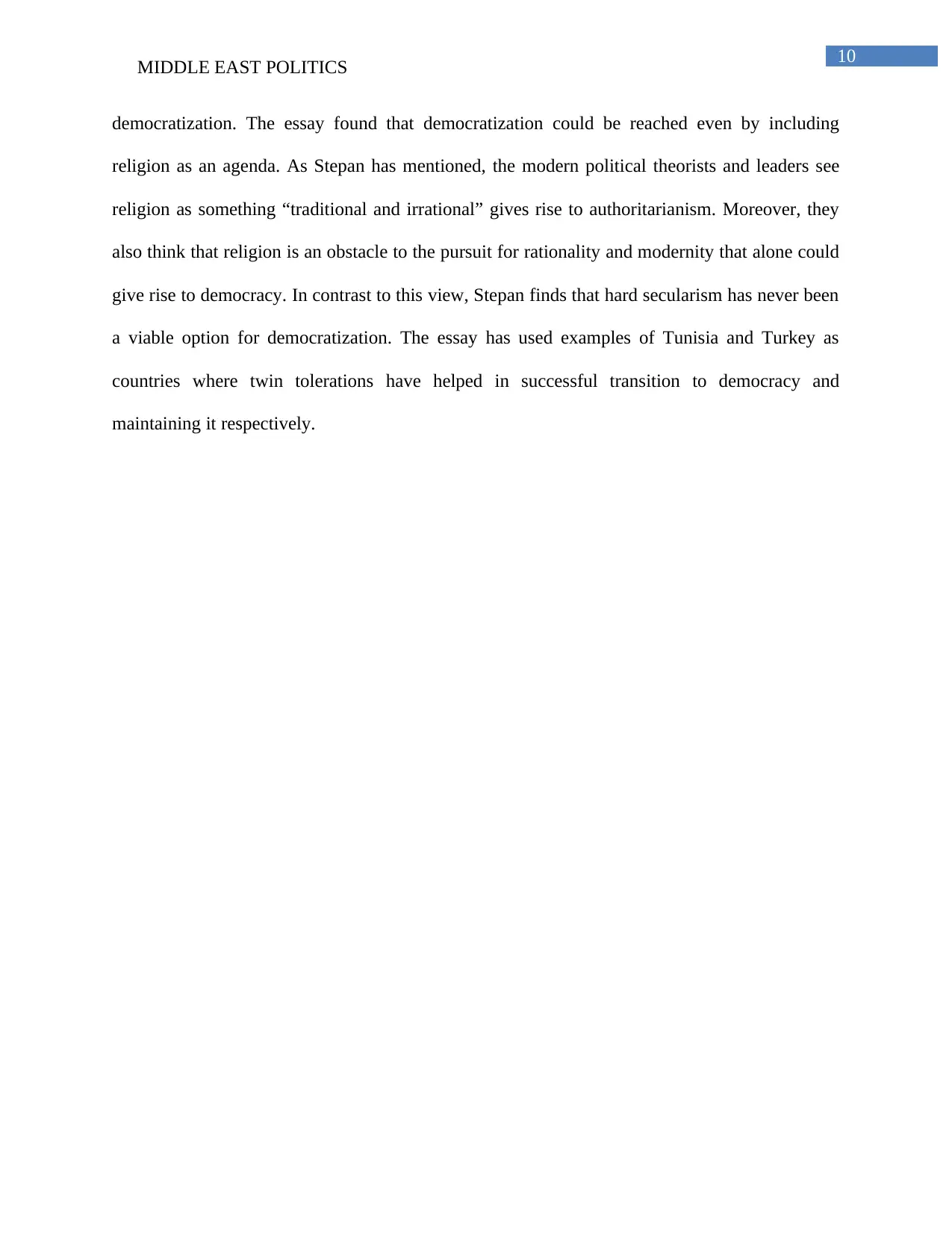
10
MIDDLE EAST POLITICS
democratization. The essay found that democratization could be reached even by including
religion as an agenda. As Stepan has mentioned, the modern political theorists and leaders see
religion as something “traditional and irrational” gives rise to authoritarianism. Moreover, they
also think that religion is an obstacle to the pursuit for rationality and modernity that alone could
give rise to democracy. In contrast to this view, Stepan finds that hard secularism has never been
a viable option for democratization. The essay has used examples of Tunisia and Turkey as
countries where twin tolerations have helped in successful transition to democracy and
maintaining it respectively.
MIDDLE EAST POLITICS
democratization. The essay found that democratization could be reached even by including
religion as an agenda. As Stepan has mentioned, the modern political theorists and leaders see
religion as something “traditional and irrational” gives rise to authoritarianism. Moreover, they
also think that religion is an obstacle to the pursuit for rationality and modernity that alone could
give rise to democracy. In contrast to this view, Stepan finds that hard secularism has never been
a viable option for democratization. The essay has used examples of Tunisia and Turkey as
countries where twin tolerations have helped in successful transition to democracy and
maintaining it respectively.
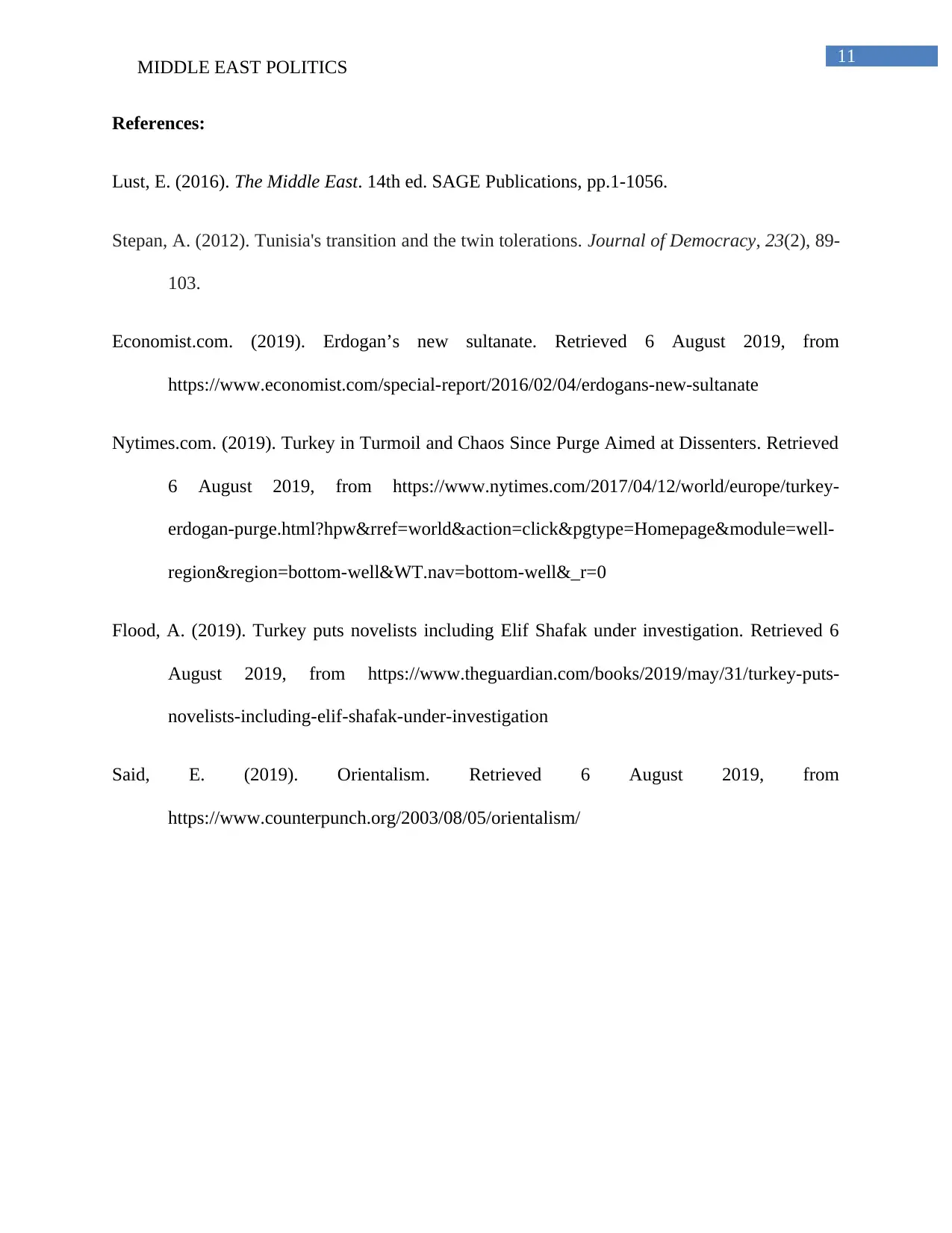
11
MIDDLE EAST POLITICS
References:
Lust, E. (2016). The Middle East. 14th ed. SAGE Publications, pp.1-1056.
Stepan, A. (2012). Tunisia's transition and the twin tolerations. Journal of Democracy, 23(2), 89-
103.
Economist.com. (2019). Erdogan’s new sultanate. Retrieved 6 August 2019, from
https://www.economist.com/special-report/2016/02/04/erdogans-new-sultanate
Nytimes.com. (2019). Turkey in Turmoil and Chaos Since Purge Aimed at Dissenters. Retrieved
6 August 2019, from https://www.nytimes.com/2017/04/12/world/europe/turkey-
erdogan-purge.html?hpw&rref=world&action=click&pgtype=Homepage&module=well-
region®ion=bottom-well&WT.nav=bottom-well&_r=0
Flood, A. (2019). Turkey puts novelists including Elif Shafak under investigation. Retrieved 6
August 2019, from https://www.theguardian.com/books/2019/may/31/turkey-puts-
novelists-including-elif-shafak-under-investigation
Said, E. (2019). Orientalism. Retrieved 6 August 2019, from
https://www.counterpunch.org/2003/08/05/orientalism/
MIDDLE EAST POLITICS
References:
Lust, E. (2016). The Middle East. 14th ed. SAGE Publications, pp.1-1056.
Stepan, A. (2012). Tunisia's transition and the twin tolerations. Journal of Democracy, 23(2), 89-
103.
Economist.com. (2019). Erdogan’s new sultanate. Retrieved 6 August 2019, from
https://www.economist.com/special-report/2016/02/04/erdogans-new-sultanate
Nytimes.com. (2019). Turkey in Turmoil and Chaos Since Purge Aimed at Dissenters. Retrieved
6 August 2019, from https://www.nytimes.com/2017/04/12/world/europe/turkey-
erdogan-purge.html?hpw&rref=world&action=click&pgtype=Homepage&module=well-
region®ion=bottom-well&WT.nav=bottom-well&_r=0
Flood, A. (2019). Turkey puts novelists including Elif Shafak under investigation. Retrieved 6
August 2019, from https://www.theguardian.com/books/2019/may/31/turkey-puts-
novelists-including-elif-shafak-under-investigation
Said, E. (2019). Orientalism. Retrieved 6 August 2019, from
https://www.counterpunch.org/2003/08/05/orientalism/
⊘ This is a preview!⊘
Do you want full access?
Subscribe today to unlock all pages.

Trusted by 1+ million students worldwide
1 out of 12
Related Documents
Your All-in-One AI-Powered Toolkit for Academic Success.
+13062052269
info@desklib.com
Available 24*7 on WhatsApp / Email
![[object Object]](/_next/static/media/star-bottom.7253800d.svg)
Unlock your academic potential
Copyright © 2020–2026 A2Z Services. All Rights Reserved. Developed and managed by ZUCOL.



